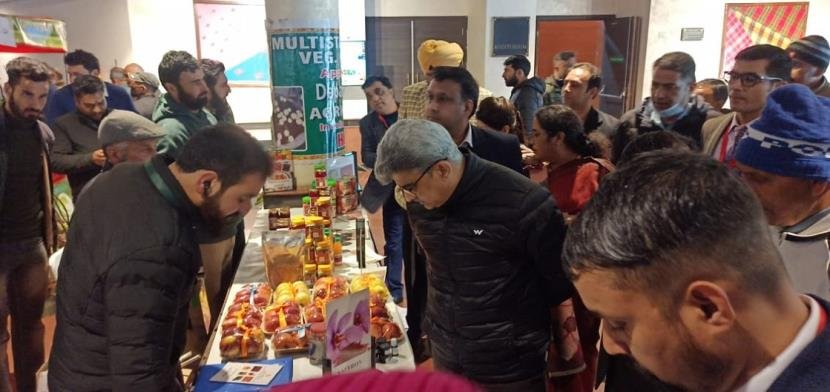The government has taken up the task of providing GI tagging to another 20-25 products which will give us an edge in the international markets.
“Expanding business and marketing opportunities for farmers with a well-planned holistic agriculture development is immensely helping Jammu and Kashmir to move towards historic transformation”, said Atal Dulloo, Additional Chief Secretary (ACS), Agriculture Production Department.
ACS said this while addressing a mammoth gathering after inaugurating one day Buyer-Seller meet organised by the department of Horticulture Planning and Marketing (HP&M).
Over three hundred growers and farmers, SHGs, FPOs and entrepreneurs hailing from different parts of J&K participated in the event.
The meet also witnessed great participation of buyers which included big merchants, exporters and multinational companies like Reliance, Big Basket and Amazon. Besides, many potential buyers, exporters, and stakeholders including HFN, Unnati Cooperatives, Uniwool, JKDCUL, Sarweshwar addressed the gathering.
Participating buyers appreciated the initiative of the department which will provide an exclusive opportunity to interact directly with the growers and farmers.
He said that the government has launched a holistic agriculture development programme in J&K. The conceptualization, formulation and approval of the massive transformative mission to reform agriculture and allied sectors in J&K was finalized and translated on ground in just 5 months of time, he added.
Pertinently, the humongous exercise began with the constitution of the Apex Committee under the Chairmanship of Mangla Rai by the Lieutenant Governor and culminated with the finalization of a transformative mission for holistic development of agriculture and allied sectors in J&K with the potential to transform the subsistence agriculture of J&K into sustainable commercial agri-economy.
Atat Duloo said the approved plan comprising 29 project proposals shall push agriculture and allied sectors to a new trajectory of growth with economy, ecology and equity as its guiding pillars, he shared. He also announced that the government has taken up the task of providing GI tagging to another 20-25 products which will give us an edge in the international markets. Besides, a high-level committee has been set up to take steps for export promotion of our significant products.
ACS further shared that the government has recently constituted a Marketing Board for facilitating the regulation of mandis and conferred various powers to the Board and the director of Horticulture, Planning and Marketing, J&K. The unified licensing has been approved as also the declaration of CA stores/warehouses/stores of FPOs/Cooperatives as sub-yards of Mandis for undergoing trade on e-NAM.
He said HP&M has moved towards a transparent e-auction system for the allocation of space in mandis and e-NAM trade has increased from less than Rs 1 crore to over Rs 23 crore in a span of 3-4 months, besides taking lead at the national level in inter-state e-NAM Trade.
Speaking on the occasion, Vanita, DGM APEDA, deliberated upon the initiatives of the organization towards the promotion of J&K agriculture and Horticulture. She informed that APEDA, a first, recently introduced the Mishri variety of cherry to the Singapore market and Kashmir Apples to Hongkong which she termed as new milestones for local products.
Later, a buyer seller interaction session was conducted where participants had a thorough and candid discussion on different aspects related to business promotion.
The government has taken up the task








